13 Reasons Why…Not (Blog Episode 2)
Did you know schools are giving out overdose prevention response training and kits to our children at school? So, that if they are in a situation where there might be someone over-dosing they can use their training and their kit (which consists of a needle and medication) to help the person overdosing.

If schools feel it’s their responsibility to give this training and these kits, I’m confident they can be giving mental health training and tool kits as well.
This Episode of 13 Reasons Why…Not is what we, as parents, can expect schools to do to help in situations like the ones presented in the Netflix Series, 13 Reasons Why. (Please read Blog Episode 1 to become more familiar with what situations I’m referring to.)
Substance abuse, bullying, slut shaming, physical violence, rape and suicide exist, as does mental illness. Most of these have been around since the start of time. Life isn’t always fair or just. And you can guarantee your kids have experienced or engaged in the activities that are presented in 13 Reasons Why. As this is their reality, now they need to know where to turn to for help. School should be one of these places. Let’s explore how as I’d like to help our kids make different choices then the ones in the show, and to do this, we need to be informed and educated about the issues. I’m using this show is a platform to start talking about what’s broken in our school system, in our communities and in our homes. This time might be even more relevant to discuss it as with the power of social media, effects can be more damaging in the blink of an eye or the push of a button.
Schools are where young people spend most of their day. They may spend more time with their friends and teachers than they do with their parents! It’s where friendships happen and where relationships form. It’s where teens find their self-worth – in popularity, in sports, in achievement. Guess what? It’s also a breeding ground for the exact opposite to happen.
Schools have an amazing platform to reach huge numbers of kids to talk about these all-important issues. And yet, most don’t. In my book, Parenting…With A Twist, I have a whole chapter entitled “More Than A Fighting Chance.” In reading it, you will come to understand that your children need more than just their school education to come out a well-adjust adult ready to face “the real world”. The good thing is that you will now have this guidance, and of course you can always get my book!
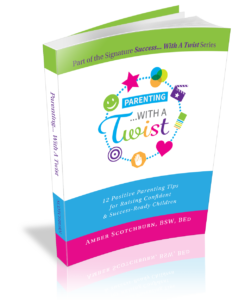
Where does your child receive information about mental health?
It’s unfortunate as it seems like kids need to get to a breaking point, like attempting suicide or something equally damaging, before information about mental health is brought to their attention. Mental health education needs to be a part of your child’s education experience, just as physical health is, just as mathematics is. So, just like they learn algebra, they should learn about how to be mentally healthy. Hmm…what skills do you use more as an adult?!
When we ignore mental health, we lose kids to a whole plethora of unhealthy choices, one of them being suicide as without the proper education, they may get to a point that suicide feels like their only option.

Lessons need to discuss mental health as something we all have to work on, teaching children relevant skills such as dealing with stress and change, understanding their own moods and thoughts, and recognizing when to ask for help. If your child is not receiving this education at home and you don’t feel equipped to walk them through it, then find someone in your community who can J!
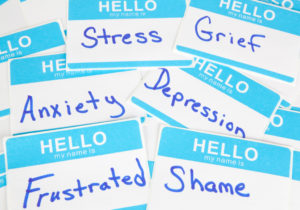
Who is your child’s advocate or cheerleader?
I consider myself a fairly astute parent, given that I have a social work and an education degree and have taught in the system. I’m also involved in my own children’s day-to-day life, as well as the vast number of tutoring families that we have helped over the years. I feel that given all of that, I know how to identify and advocate for what’s needed for a child to excel! However, when my own children experienced some mental health concerns, I was told that unless they were red flagged that support services weren’t available to them. So, again, unless a child is already exhibiting behaviours that are deemed unacceptable, they are not given the help they need.
This leads me to suggest that all school personal need to have mental health training as well. So that they know what to look for and then how to respond appropriately as this did not happen in the Netflix series 13 Reasons Why, nor has it happened in most of the cases I have worked through.
That said, we still need to help our children identify who can be their advocates at school. There are teachers, teachers aides, principals, vice principals, counselors, social workers and child and youth workers to name a few! Work with your child on finding at least one person that they can identify as a safe person at school.

Examine their school environment to see who this could be? You want someone who is going to be their cheerleader! Helping your child identify who the are in their world will provide them with a healthy place to go when they need support. Their confidence will rise when they can point out their cheerleaders—people who believe they can do it, support them in getting there, and lift them back up when they fall. In our tutoring agency, we refer to ourselves as Math Coaches and Reading Cheerleaders!
Beyond school, look for other advocates for your child. Ensure that your child has people in their world that they can open up to that judge their behaviour but not them. Kids need unconditional love. Hopefully this can be you! We will talk about your role as a parent in this capacity in another episode.
Are Your Children Allowed to Say “No” or Negotiate?

Does your child know how to say no or change their mind…with confidence, ease and even some humour thrown in? Our society is set up to teach children to be people pleasers: to always say “Yes” to their parents, teachers, and other people of authority. And we label a child as a troublemaker when they say “No.”
Then the child turns into a teen and we want them to “Just say no.” when they get into awkward, intense, potentially life-changing situations. Like, “Just say no” to drugs. Or, “Just say no” to sex. Or, “Just say no” to drinking and driving and more currently, texting and driving. In all of these conversations, we emphasize that they understand why they need to say “No.” For example, drinking and driving can lead to the wrecked car they show us every year at the “Just Say No Drinking & Driving” assembly. Now they even take kids to the morgue to really drill the point in as to why you shouldn’t drink and drive. However, statistics would suggest that people still drink and drive, even adults.

So, kids can recite back to us the ‘why’ of not doing something, but where do our kids get to practice the just saying no. The times where your child has practiced saying no to you, I’m sure hasn’t gone over very well. What about when they’ve said it to their teacher or a coach?
Ensure your kids understand that it’s ok to say “no” to authority figures in their world. Oh and next up, there will be an episode on how to accept this as a parent as well!
Get Curious, Not Punitive!
Get curious with your children and empathetic to where they are at in their lives. Ask questions! Find out what makes them tick! Find out their ‘why’! You will have many opportunities to change a mood and select your words, but there isn’t an opportunity to replace your words once they’ve escaped. So choose wisely!
There doesn’t have to be blind trust in your child’s teacher or any another key influencer as they are not the experts on your child. So, get curious with the people in your child’s world as well! For example, if a problem arises at school: Ask for their evidence of what it is they are suggesting is the issue. Ask why they think it’s happening. Ask for other opinions to be taken into consideration. Ask for other possible factors that could be contributing.
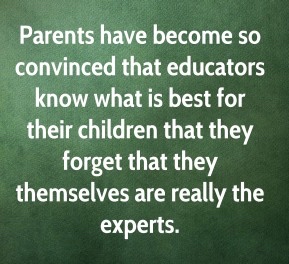
Running a tutoring agency, we get the calls from parents where the school has suggested that there is “something wrong” with a child. We right away train our parents to get curious! In getting curious, you can start to see if there are any patterns in your child’s behaviours. For example: if the behaviour happens in one environment and not another, what is the root cause of the behaviour? What can we change to make the environment a safe place for your child?
Since school is where children spend most of their childhood, I urge you to engage with the school. I would suggest you introduce yourself to your child’s teacher prior to teacher-parent conferences. Check in with them about what would work best to keep in regular contact: email, agenda, phone call. If you only start engaging when your child is in trouble, then you haven’t developed a rapport to begin to build bridges. Plan to volunteer at school! There are many opportunities with various time commitments. Research shows that students thrive, whose parents volunteer at school. In my book, under the workbook section, we lay out the steps to forming solid relationships with your child’s teacher.
Are You “Happy…Just Because”?
The line of success is not straight and not without its intense moments. Sometimes it’s caused by our own actions and reactions and other times by things out of our control. Life is just like that.
When you are thinking about reaching your parenting hopes, wishes and dreams, just remember, it won’t be smooth sailing. Be ready for some choppy waters along the way.
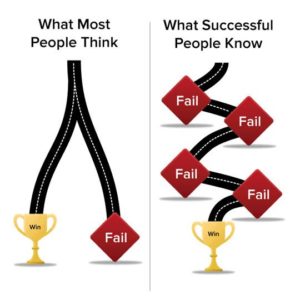
You have this same choice in life. People aren’t going to always like you, including your kids and yourself, but you have a choice to live in that moment or not. When you shift to being happy ‘just because,’ you won’t be waiting your whole life for something to happen, a whole list of things to be happy about, or for somebody else’s approval. You will be living life on your terms!
Mental health means striking a balance in all aspects of your life: social, physical, spiritual, emotional, economic, and mental. Reaching a balance is a learning process. At times, you may tip the balance too much in one direction and have to find your footing again. Your personal balance will be unique, and your challenge will be to stay mentally and emotionally healthy by keeping that balance. As well, you will want to be able to ‘Be Happy…Just Because’ no matter what life brings. You aren’t waiting for something to happen to make you happy or having your happiness taken away just because something doesn’t go your way.

How do we get our child to the point of being happy…just because, no matter what is happening around them and who they are dealing with? By teaching them to realize that they only have control over their own reactions. They cannot control the other person’s negativity or anxiousness, but they can control their reaction to it.
Throughout our life, we deal with people who are going to rub us the wrong way. The key is to treat what they are saying as if it’s exactly what you want to hear. When you are asking your child to get ready for bed and they give you some attitude about it, take their tone, language, volume, etc. out of it and pretend they are saying: “Of course I’ll go get ready for bed.” Then, continue the conversation with them. When you don’t fuel the fire, it has nowhere to go but out! I use this strategy with my youngest son who can get fiery quite quickly. It works almost every time. I’ve been doing this with him for a while, simply because I didn’t know how else to deal with his anger. Anger is so opposite to my being that I had to learn to remove the emotion and speak to him as though he’d just said exactly what I wanted to hear. What’s great about this too is that I’m role modeling for him what to do when he gets angry in the future or somebody raises their voice to him.
When using the above strategy doesn’t work, I use humour. Just as you wouldn’t fight fire with fire, you’d use water; it’s the same principle. My humour is genuine; it’s not sarcasm because I want to calm the fire, not inflame it.
Another way to deflect another’s emotional state is to simply say the way the person is feeling back to them, not taking responsibility for their feelings, but in acknowledgement of them. You are not responsible for another’s feelings but to acknowledge them is a loving act of compassion!
Yes, you have permission to be happy without having to accomplish or obtain the next ten things on your To Do lists ;)!

Look for our next episode on 13 Reasons Why…NOT!
Needles Anyone?
School Stops for Summer, Should Learning Stop too?!
What is Summer Learning Loss?
All students experience learning losses–what educators and researchers refer to as the “summer brain drain”–when they do not engage in educational activities during the summer.
Most students lose about two months of grade level equivalency in mathematical computation skills over the summer months. Without practice, students lose reading skills over the summer months too.
- Research spanning 100 years shows that students typically score lower on standardized tests at the end of summer vacation than they do on the same tests at the beginning of the summer (White, 1906; Entwisle & Alexander 1992; Cooper, 1996; Downey et al. 2004).
- Parents consistently cite summer as the most difficult time to ensure that their children have productive things to do (Duffett et al. 2004)
- Low-income students lose more than two months in reading achievement (Cooper, 1996)
- About two-thirds of the ninth-grade achievement gap can be explained by unequal access to summer learning opportunities during the elementary school years (Alexander, 2007).
When school doors close for the summer, what do kids face? For some, it’s a world of interesting vacations, music lessons, and library trips. For others without enriching summertime opportunities, the break can lead to serious academic consequences—and the disparity can be dramatic.
YOU can STOP summer learning loss with our Summer Bridge Solutions! Contact us if you are interested in learning more about our solutions!
Our solutions maintain year end academic outcomes for math and reading in students, meaning it helps them to retain knowledge from year to year. Studies demonstrate that completion of the grade specific summer programs resulted in the elimination of summer learning loss.
Summer is a glorious time for exploratory learning, creative pursuits and outdoor activities. It should not be a time when math, writing and reading skills slide backward.
13 Reasons Why…Not Episode 1
13 Reasons Why…Not

The reality of television is not what it was like in the past when a family would have one TV and the entire family would crowd around to watch a show together. Now, your kids could be watching almost anything, at almost any time, as shows are available on phones, iPads, laptops, and televisions!
The Netflix Series, 13 Reasons Why, revolves around a 17 year old, Hannah Baker, who takes her own life. She leaves behind 13 audio recordings outlining 13 reasons why she made the decision to end her life.
People of all ages are binge-watching the Series, as only one can with Netflix ;)! In its first week alone, there were 3,585,110 tweets about the Series. Proof that people are watching it and then, posting about it!
School Districts across North America are warning parents of this series and suggesting that people don’t watch it, as they feel it glorifies suicide. I’d like to take a different perspective and actually invite you to watch it.

I’d like to walk you through watching it and offer a perspective on mental illness that I hope you find enlightening. I don’t believe in shutting our eyes and ears and not discussing what could be our children’s reality with them. Or, perhaps even your own reality or somebody else you love.
I want to give you the tools to be able to recognize what mental illness is and what it may manifest so that you can look for signs in your house or classroom, as well as teach kids to be aware of it for themselves or people who cross their path.
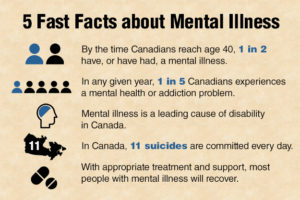
The Netflix Series contains very graphic depictions of violence, including a rape scene in Episode 12 and the actual suicide in Episode 13. I implore you to, at the very least, watch those episodes if you have even the slightest indication that your child has watched them. I’ve had numerous parents suggest to me that they will not watch it. I hope this conversation changes their mind.
My goal is to give you some guidance from the standpoint of a social worker, teacher, tutor CEO, parenting author and parent myself. I’ve worked with a lot of parents and a lot of children in my over two decades of doing this work. I wrote my book, Parenting…With A Twist: 12 Positive Parenting Tips to Raising Success-Ready & Confident Children to give parents a go to manual to help them be the best parents EVER.

Our family that was old enough so a 13 year old, almost 17 year old, 21 year old and my partner and I watched it together. One of the first conversations it led to was the question — what does mental illness look and feel like.
Our eldest son, the almost 17 year old, has mental illness tendencies that cause him to make certain decisions and choices that to somebody on the outside who does not have an understanding of mental illness, may label as “lazy”, “not trying”, or “just a teen”. However, he had a counsellor once that used an amazing analogy to explain depression to him so that he could then explain it to others.

Think of a person who is swimming in the ocean and doesn’t see land or any other structure or person in sight. After swimming for awhile that person may get tired, and feel overwhelmed. In this case, they may start going under and barely be able to come back up for air. Experiencing mental illness can feel this way. And the key is: what can help somebody to not give up but continue to swim? We will give 13 Reasons Why…Not to choose to stop swimming. In other words, 13 Reasons To KEEP Swimming!
- What is your children’s reality?
- Have they experienced any forms of bullying or physical or sexual assault and/or witnessed or heard about it? Have you?
- Do they know what to do in these situations? Do you?
- Do you know the signs of mental illness? Do your children?
Let’s investigate all of this together over the next 13 episodes so that we can help be somebody’s change to be the reason they choose NOT to take their own life.

Summer Brain Drain
All students experience learning losses–what educators and researchers refer to as the “summer brain drain”–when they do not engage in educational activities during the summer.
Amber Scotchburn talks about what that means and how you can combat it.
Podcast: Play in new window | Download
Subscribe: Apple Podcasts | Android | RSS
Parent-Teacher Conference Questions

Specific Parent-Teacher Conference Questions
The “you” in these questions refers to the teacher. The “you” in the explanation below the question refers to you as the parent.
1. “Can you explain the breakdown of my child’s current assessment?”
-You will want to ensure that you are being honest about where your child is at in their home life as well. This helps the teacher see your child as a whole, rather than just someone they are assessing.
2. “What do you see are my child’s weaknesses and strengths?”
-Having the growth mindset, you will want to see weaknesses as correctable and strengths as the effects of hard work.
3. “Can you please show me the assessment criteria you used to mark my child’s work?”
– This is important as it lets you know what the teacher was looking for when assessing your child.
4. “Was my child aware of this criteria prior to completing the work?”
-If not, you will want this to change. Your child must be aware of what they are getting marked on prior to handing in their work. Otherwise, it’s like telling a child you are going to rate how well they ride their bike but you haven’t told them that you expect them to jump two curbs and pop a wheely!
5. “How many pieces of work were assessed?”
-Your child might have received a certain grading on one assignment and that defined their whole assessment. Then you will have to decide if it’s really worth stressing over as one test or whatever the assesssment tool was, is not an accurate representation of your child’s abilities.
6. “Can you please show me the work that was assessed and the assessment sheet that assigned my child their mark?”
-This will let you know what was actually included in determining the mark, as well as see where your child is falling short.
7. “Did my child have an opportunity to practice the skill before being marked on it? If so, can you please show me their work from inception to completion?”
-This will let you see the process the teacher worked through with your child to learn the skill being assessed, as well as your child’s progress on the journey.
8. “Did my child have an opportunity to re-hand in any of the work or can they still re-hand in work?”
-Now that you and your child know what the expectations are, determine how they could improve.
9. “Can you please show me what the highest level assignment looks like for the assignments that my child did not do well on?”
-This will give you an idea of that specific teacher’s expectations.
10. “Can I please have any upcoming assessment criteria and assignment due dates and topics?”
-This information will be needed so you can fully support your child in any assessment pieces, moving forward.
11. “Can you please provide me with the upcoming schedule of all student work: topics, assignments, tests?”
-You will be able to help your child prepare more effectively.
12. “Can you set up a dialogue between my child and yourself, where they show their piece that will be assessed and have you determine what grade level it is currently?”
-This gives your child responsibility in the process and allows them to make a conscious choice to improve and understand how to do so.
13. a) “Will you provide any sort of review for the final exam (if there is one)?”
-Getting a review for the final exam ensures that your child is aware of what is on it. When your child does the review, they will see if they understand the material. Remember to have your child put the dates for final exams in their agenda and then work backwards from that date to put in when they should study, when they should have the review completed by, and when they should schedule time for asking the teacher any questions they don’t understand.
b) “If so, can my child have the review earlier?”
-It’s important to get the review as soon as the teacher is able to provide it as that gives your child more time to manage all the tasks that go into writing an exam.
c) “If not, what could you suggest my child do to prepare?”
-When a teacher doesn’t provide a review, this makes it heard on the student to know what the important pieces are that they have covered.
14. “What would be the best course of action right now to catch up, keep up, and/or excel?”
-The teacher ultimately decides on the grade your child is going to get, as well as the path it will take them to get there; so, it’s best to make an action plan for success with them.
15. “How is it best to communicate with you moving forward?”
-Agenda, email, phone call, and/or in person meetings could be some of the suggestions.
16. “Are you willing to communicate with a tutor?”
-If so, ask them what the best method of communication would be.

Lunch Box Blues
Are lunches are a major source of arguments, worry, stress or heartache in your house?

Lunch Funnies
Friday’s lunch is a collection of all the scraps that my child hasn’t eaten from the last week.
My child was jealous about other kids getting notes in their lunches, so I put one in his: “Sorry, I ate your pudding. Love, Mom.”
“Kids, do you want pop tarts or cereal for lunch?” This installment of ‘parenting done right’ is sponsored by last night’s Chardonnay!

My Child Doesn’t Eat Their Lunch
A good lunch benefits a student by giving them the energy to remain alert during class time. If you don’t want your child to get “hangry” — hungry and angry — then make sure they are eating their lunch!
If your child regularly doensn’t each their lunch, something needs to change as kids need to fuel their brains and bodies! Check if it’s because they are bored or don’t like the food and keep reading as we’ve addressed these reasons below!
If you find out it’s because they don’t get enough time at school to eat, investigate this further with the school as lunch is a necessity.

Cheers To Successful Lunch Making
(Brought to us by STIR Cooking School & Tutoring…With A Twist!)
1 – LEFTOVERS
Whether it’s last night’s curry warmed up in a thermos, quinoa made into a salad or roasted veggies tucked in a wrap with some hummus, leftovers are a game changer. (If any of those dishes sound great, STIR Cooking school can help you make them!)
When you make dinner, make extra servings and then put them aside for lunches for the next day. Or, if lunch is needed for the next day, freeze it in individual portions to use in the future.

2 – OWNERSHIP
Sometimes WHO makes the lunch is more important than WHAT is in it! If a child packs their own lunch, they are more likely to eat it!
As ownership of lunches is important and as we’ve suggested that you can use leftovers for lunches, having your children involved in dinner preperations is important too.
Plus, you won’t have to put a note like the one above in ;)!
3 – CATEGORIES
Ensure that something from each of the following categories is in your child’s lunch, regardless of who’s making it.
Put the following list where it will be seen while making lunches.
A) Protein
B) Fruits & Vegetables
C) Whole Grains/Rice/Pasta
D) Healthy Snacks

4 – SIMPLE & FUN IDEAS
Choosing a theme occasionally, Italian with a skewer of tomato and mozzarella cheese, and pasta with a healthy meat sauce. Mexican lunch could include mini taco’s, salsa/ guacamole and corn chips with a bean and corn salad.
Try different nut/seed and dried fruit mixes, popcorn with a tasty spice mix or some pita or kale chips to keep things interesting!
Lunches in a jar are fun and easy! Have your kids do a food jar idea, search on the internet as there is an endless number of great ideas that are fun and delicious. Here is one site to get you started:
http://www.simplemost.com/13-make-ahead-ridiculously-good-lunch-jar-lunches-arent-salad/
In doing my research for this article, I came across an eating program in the States that has a reward system for children who bring a rainbow in their lunch! On Rainbow Day, students are asked to use fruits and vegetables to create a “rainbow” of at least three colours. Once they have finished eating their “rainbow”, they’ll receive a sticker or other small reward. This introduces the concept of eating a plate full of colourful fruits and vegetables.

5 – PREP
Pack lunches the night before. If you are using leftovers, pack them right after dinner and tuck them in the fridge, ready for the morning rush. Then, all you have to do is heat thermos contents in the morning.
Pick up a lunch box container with dividers. It makes packing a lunch that includes all the categories mentioned above, a whole process easier.

The Importance of Teaching Your Child Now
By teaching your children these skills in elementary school (and high school), you will be setting them up for success in life! They will be learning the importance of food preperation, the necessities of a healthy meal, and time management skills.
Transitioning Back To School
Tips & Tricks!
“THANK YOU for your wonderful Expert Advice on how to transition Johnny back to school! We followed your easy tips and mornings don’t seem too crazy anymore!”
Jean & John, Parents of An Anxious Child
Do you feel ready for back to school? If you are like most parents…you probably are having some anxiety yourself about it, never mind how your children are feeling! If this sounds right for you, you will hopefully find a suggestion or two that will work for your family!
1) BEDTIME & OTHER ROUTINES…

This may not make you popular with your kids…but, have them start to transition slowly back to their bedtime and their morning wake up time’s when they are in school. Sleep and routine are two of the most important factors to any good transition.
And this may not make me popular with you…but, start prepping yourself to wake up before the kids do. The time you can get to yourself in the morning before the rush begins gives you some time to rejuvinate for your day ahead.
If there after school routine is to start homework or do dinner prep, both of those can be started immediately. “Homework” time can look like reading, doing a puzzle, researching something they are interested in (like healthy school lunches!), working on their summer journal (see below!).
And keep the conversation flowing around “when you are back in school, we do these routines as it helps you, me, the family, your teachers, and everybody in your life to be successful”!
2) NIGHT BEFORE PREP
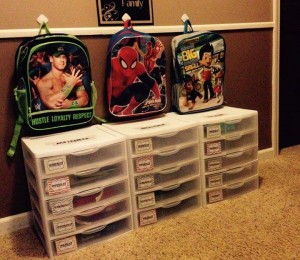
Have your kids and yourself prepare the night before:
-lunches made & water bottle filled
-bags packed for homework, gym strip, library books, etc.
-breakfast options out & ready to be consumed
-bathroom times scheduled
-clothes and for some kids, even shoes picked out
What this means for right now is to ensure you have the above sorted out.
-Do your kids have a lunch pack? backpack? school supplies.
-What will your kids eat for lunch & breakfast? Is it at least 80% healthy goodness? Anything you can pre-prep on the weekends to make lunches easier?
-Do you have non-leak water bottles? Did you label them?
-Start having the conversation about bathroom routines! Who gets which bathroom when?!
And keep the conversation flowing around “when you are back in school, we do this pre-prep as it helps you, me, the family, your teachers, and everybody in your life to be successful”!
3) THE TEN MINUTE ADVANTAGE
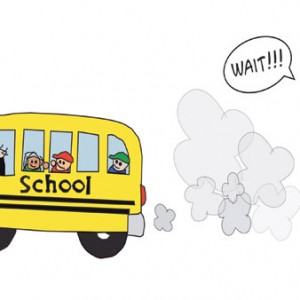
Plan to leave the house 5-10 minutes before you actually have to! Sometimes that might even mean setting your clocks ten minute fast or changing the time that everybody needs to be out the door to ten minutes earlier. This is one of the oldest tricks in the book and it works! And imagine the feeling when you know you are ready to walk out the door but you can actually take a deep breath and instead set an amazing intention for your day! We dare you to try it now for the next place you have a designated time to be there.
And keep the conversation flowing around “when you are back in school, we do this ten minute advantage as it helps you, me, the family, your teachers, and everybody in your life to be successful”!
4) PLAN A BACK TO SCHOOL CELEBRATION

Arrange a back to school special sleep over or celebration.
And, arrange play dates throughout the year!
5) EXTRA-CURRICULARS

When scheduling extra-curricular activities have it based on quality, not quantity and on their interests! If finances are a concern, use free community resources like the library that have clubs (i.e. lego clubs) that meet regularly. Or, source out scholarships that pay for such programming.
5) OPEN LINES OF COMMUNICATION WITH THE SCHOOL!

Maintain open lines of communication with the school. Ask the teacher whether their preference would be email or using the school agenda.
Plan to volunteer at school. There are many opportunities with various time commitments. Research shows that students whose parents volunteer at school thrive.
So you have probably figured out by now that we feel conversation is pretty important! Research shows that if kids truly understand the why behind what they are doing and then begin to adopt the why for themselves, their engagement and interest in doing something increases exponentially!
Let us know how it goes!
Lifeline — Past Versus Present
It’s important to realize that not to get stuck in the past or caught up in the future; you miss the precious moments that make up our lives! Human nature is unappreciative of what is in the moment as we are conditioned to have attachments to things in the past and to focus on what we desire in the future.
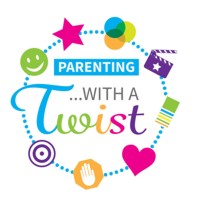
Podcast: Play in new window | Download
Subscribe: Apple Podcasts | Android | RSS
Gratitude Journal & Affirmations
A gratitude journal is a diary of things for which one is grateful for. Gratitude journals are used by individuals who wish to focus their attention on the positive things in their lives. Our current beliefs and habits result from our repeated thoughts. If our child wasn’t able to come up with something they are grateful for because they are in such a negative space, we knew we needed to replace these negative thoughts with positive ones and used affirmations to do so.

Podcast: Play in new window | Download
Subscribe: Apple Podcasts | Android | RSS
Recent Comments
-

Amber Scotchburn
I would love to keep sharing information with you!
Please let me know what else you would like to hear about,
Amber -

Amber Scotchburn
Thank you :)!
Where did you share this?
Amber -

Amber Scotchburn
Thanks :)!
I’d love you to put the link to the results that you found about the Mid East, perhaps I can put it in a future podcast.
Amber -
Google
Google
Wonderful story, reckoned we could combine a handful of unrelated data, nevertheless definitely worth taking a search, whoa did 1 find out about Mid East has got additional problerms too.
-
Google
Google
Here is a good Blog You may Locate Interesting that we encourage you to visit.









